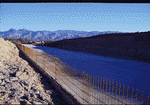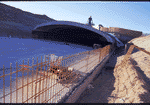
What This Community Needs Is More Shopping Centers And Fewer Natural Washes, Right?
By Dave Devine
THE CENTURIES-OLD Coronado Ridge Wash was executed a few
weeks ago.
The wash, near Broadway and Houghton, was sentenced to die in
1991 by the Tucson Board of Adjustment because it stood in the
way of a shopping-center development.
 Recently it was entombed in a concrete coffin. The land around
it has been leveled and stripped bare. A sign on the property
proudly announces that a new Smith's store will be opening November
19.
Recently it was entombed in a concrete coffin. The land around
it has been leveled and stripped bare. A sign on the property
proudly announces that a new Smith's store will be opening November
19.
Immediately east and south of the now-barren seven-acre site,
the desert is still blooming. Still farther east looms the tan-and-purplish
stucco sameness of the Brentwood Hills subdivision.
Land surrounding the Coronado Ridge wash had been zoned for commercial
development while it was in Pima County; Broadway Houghton Associates
bought the property in 1981. The city annexed the area in 1984,
and in 1990 imposed restrictions on proposed development near
the wash under the new "Environmental Resource Zone"
classification. One of the goals of this zoning classification
was to "conserve certain designated washes...as areas of
natural and scenic resources and provide valuable wildlife habitat."
But these regulations meant that the proposed shopping center
couldn't be built as planned, and that some of the property couldn't
be built on at all. To change that, the owners sought a zoning
variance from the Board of Adjustment to allow the construction
of a typical retail development.
The Board unanimously granted the request. Apparently to soothe
its conscience about murdering the wash, the Board imposed a condition
intended to mitigate the loss of the natural habitat. It required
that "landscaping installed on the property, in the adjoining
public rights-of-way of Houghton Road and Broadway Boulevard,
and at an off-site location or locations to be designated by the
City of Tucson," should equal 100 percent of what was destroyed.
This death sentence was appealed to the City Council, which changed
the conditions of the variance hoping to save the wash. But legal
action followed and the Board's decision was upheld.
 Last year the wash's execution date was finally set. The city
approved a plan for the standard cookie-cutter shopping-center
layout, except that there will be a denser-than-usual grouping
of trees in narrow planting strips along the boundaries of the
property.
Last year the wash's execution date was finally set. The city
approved a plan for the standard cookie-cutter shopping-center
layout, except that there will be a denser-than-usual grouping
of trees in narrow planting strips along the boundaries of the
property.
But there wasn't enough room in the planting islands to meet
the Board of Adjustment's "100-percent" landscape mitigation
requirement. So the developer will place $4,000 into an escrow
account to allow the city to buy 112 trees. These will be planted,
perhaps in nearby Case Park, to supposedly make up for some of
the loss of the natural habitat once provided by the Coronado
Ridge Wash.
TUCSON CITY Councilwoman Janet Marcus, who represents the
area and who fought to save the wash, says she feels awful about
what's happened. She doesn't understand why another grocery store
is needed in an area where there are several already.
Marcus says one lesson to be learned from this tragedy is that
governments shouldn't place hard zoning classifications on vacant
land. If that happens, she says, the public gets stuck with whatever
was approved in the past despite more recent changes in zoning
regulations.
Developer Neil Simon, of Broadway Houghton Associates, takes
a different perspective. The lesson taught by this case, in his
opinion, is that this was an unusual piece of property which had
previously been zoned for commercial development.
 Simon maintains the Environmental Resource Zone hasn't been undone
by this development. Simon adds he's glad the project is finally
under way after so many years and says soon the neighbors will
have a nice shopping center.
Simon maintains the Environmental Resource Zone hasn't been undone
by this development. Simon adds he's glad the project is finally
under way after so many years and says soon the neighbors will
have a nice shopping center.
Leo Pilachowski, one of the primary advocates for saving the
wash, says this case demonstrated that opposing the Board of Adjustment's
decision didn't lead to the Environmental Resource Zone being
overturned in the courts, as some had predicted.
Pilachowski says Tucson is "wealthy enough in resources
to leave these areas in their natural state." He adds we
diminish ourselves by not looking for more of a balance between
nature and development in this community.
So the Coronado Ridge Wash now lies buried in a concrete tomb
under a piece of dirt as flat as a billiard table. Within a few
months, two buildings will rise on the site to be surrounded by
406 parking spaces, and 182 neatly arranged trees intended to
replace the once-natural habitat.
At the nearby Chevron gas station, generic cigarettes were on
sale recently for $1.69, plus tax. A butterfly lay in the driveway,
desperately flapping its wings, trying to prolong life. Nearby
was a dead bird, no longer needing a home.

|





